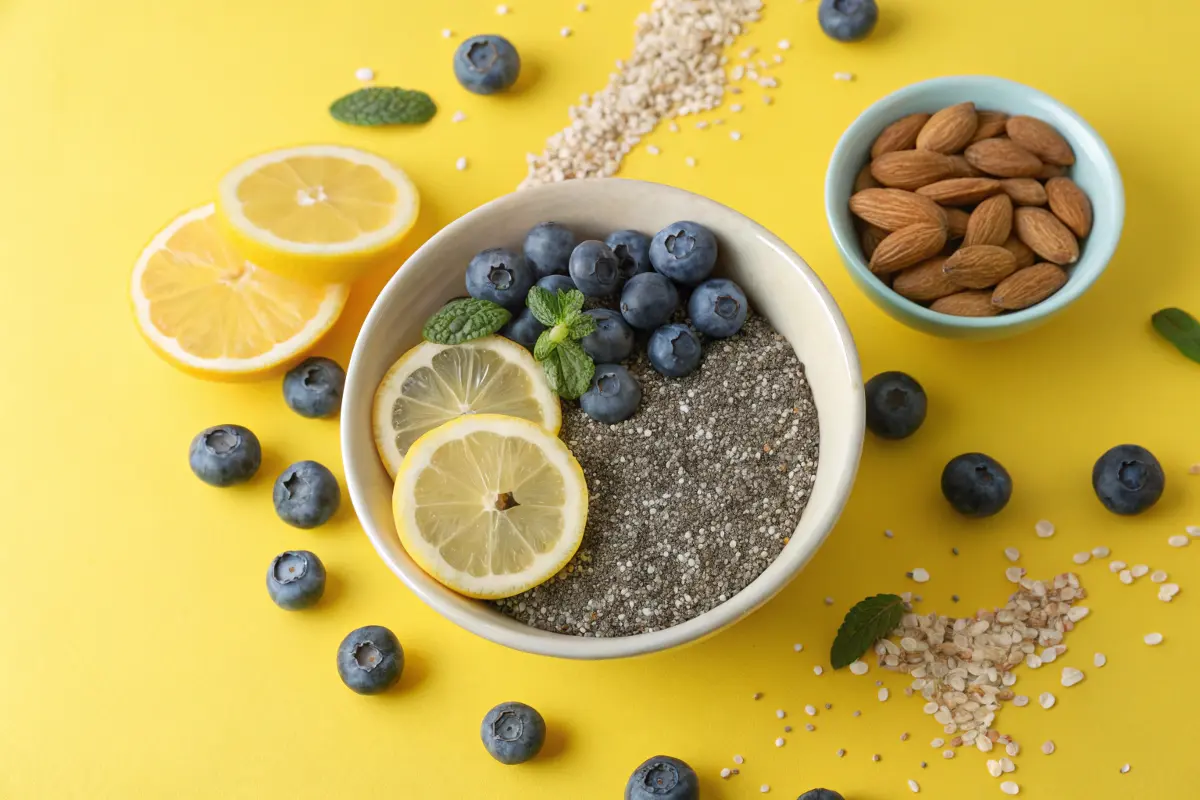Are Chia Seeds Inflammatory? Let’s Uncover the Truth
Chia seeds are often called a superfood, but some people wonder, “Are chia seeds inflammatory?” These tiny seeds are full of nutrients, but it’s important to understand whether they reduce inflammation or increase it. To answer this question, we need to first look at how inflammation works and what makes a food “inflammatory” or “anti-inflammatory.”
Table of contents
- Are Chia Seeds Inflammatory? Let’s Uncover the Truth
- The Nutritional Profile of Chia Seeds and Inflammation
- How Do Chia Seeds Affect Inflammatory Pathways?
- Are Chia Seeds Inflammatory or Anti-inflammatory?
- Who Can Benefit Most from Chia Seeds?
- Can Chia Seeds Trigger Inflammation in Sensitive Individuals?
- Chia Seeds and Chronic Inflammatory Conditions
- How to Incorporate Chia Seeds for Anti-inflammatory Benefits
- The Science Behind Chia Seeds and Inflammation
- Conclusion: Are Chia Seeds Inflammatory?
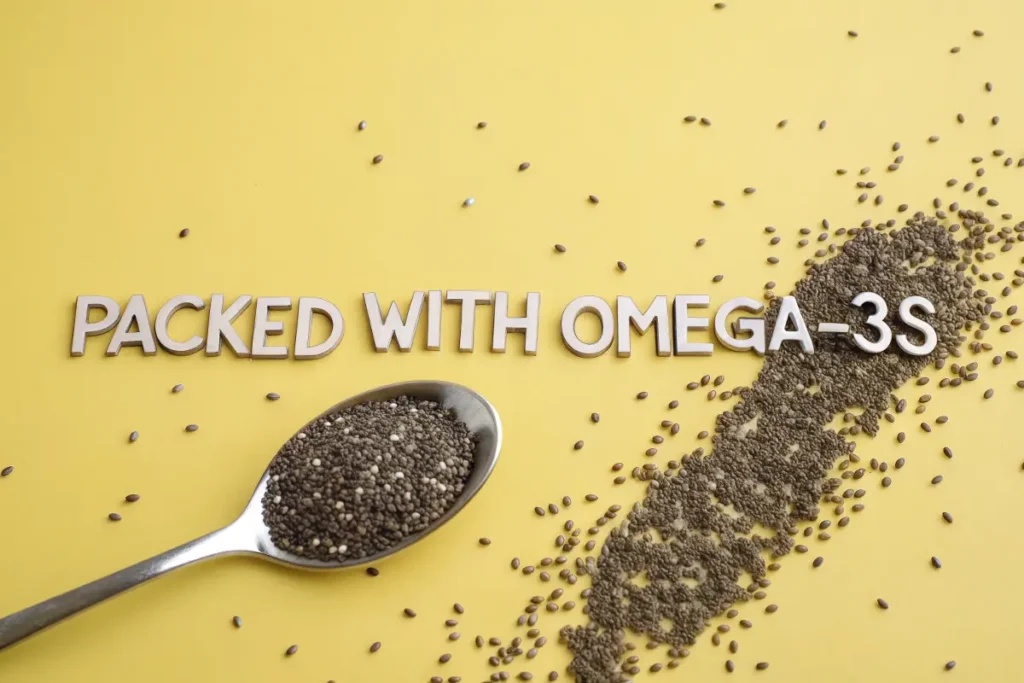
Understanding Inflammation and Its Causes
Inflammation is how your body protects itself from injury or illness. For example, if you get a cut or catch a cold, your immune system creates inflammation to heal the damage. However, when inflammation becomes chronic, it can harm your body instead of helping it. Poor diet, high stress levels, and certain lifestyle choices can trigger long-term inflammation, which increases your risk for diseases like arthritis, diabetes, and heart disease.
Foods with unhealthy fats, added sugars, or low nutritional value can worsen inflammation. However, foods rich in fiber, omega-3 fatty acids, and antioxidants, like chia seeds, may help reduce it.
What Does “Inflammatory” Really Mean?
When someone calls a food “inflammatory,” it means the food contains components that might worsen inflammation in the body. For example, high levels of omega-6 fatty acids, refined sugars, or preservatives can lead to an imbalance in your body. On the other hand, anti-inflammatory foods like chia seeds provide nutrients that help lower inflammation. These include omega-3 fatty acids, which are known for reducing inflammation, and antioxidants, which fight harmful free radicals.
The Nutritional Profile of Chia Seeds and Inflammation
If you’ve ever wondered, “Are chia seeds inflammatory?”, the answer lies in their powerful nutritional profile. Chia seeds are not only packed with essential nutrients, but they also contain key components that fight inflammation in the body. Let’s break down how omega-3s, fiber, and antioxidants make chia seeds a superfood for reducing inflammation.
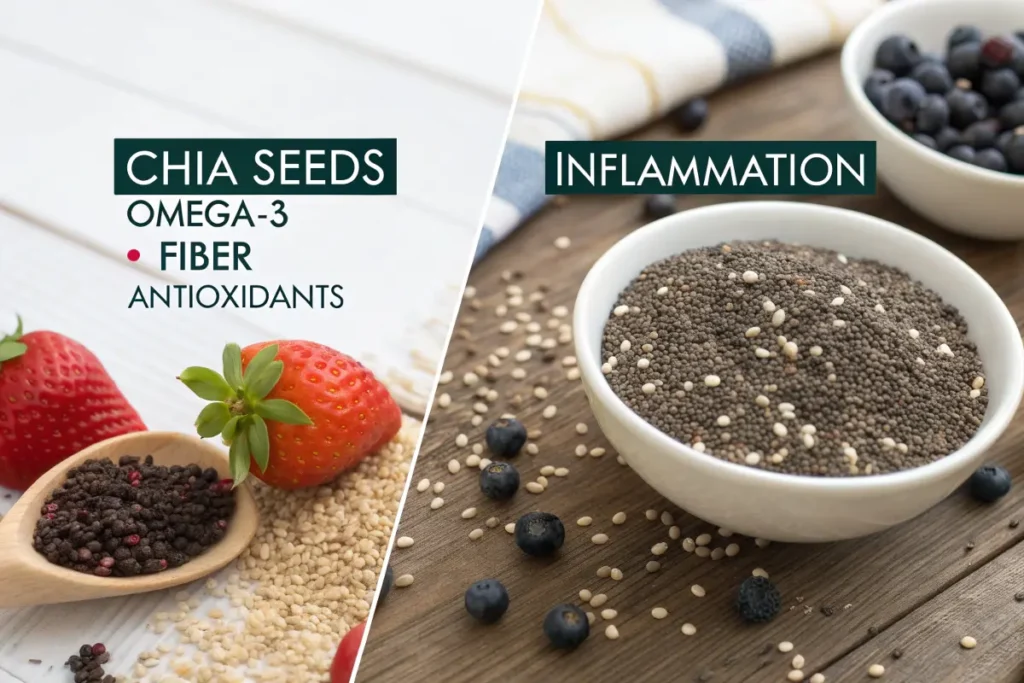
Omega-3 Fatty Acids: Anti-Inflammatory Heroes
Chia seeds are one of the best plant-based sources of omega-3 fatty acids, especially alpha-linolenic acid (ALA). Omega-3s are well-known for their ability to fight inflammation. These healthy fats help regulate your immune system and reduce the production of inflammatory molecules in the body.
Studies show that eating foods rich in omega-3s, like chia seeds, can lower your risk of chronic conditions such as heart disease and arthritis. Adding chia seeds to your meals is an easy way to give your body the anti-inflammatory support it needs.
The Role of Fiber in Reducing Inflammation
Fiber plays a key role in reducing inflammation, and chia seeds are an excellent source of both soluble and insoluble fiber. Soluble fiber absorbs water, forming a gel-like substance in your gut that promotes the growth of healthy gut bacteria. These bacteria produce short-chain fatty acids (SCFAs), which help reduce inflammation in your digestive tract.
On the other hand, insoluble fiber adds bulk to your stool, improving bowel regularity and preventing gut irritation. If you’ve been asking, “Are chia seeds inflammatory?”, the high fiber content is one reason why they are considered anti-inflammatory.
Antioxidants in Chia Seeds
Chia seeds are also packed with antioxidants, which protect your cells from damage caused by free radicals. Free radicals are harmful molecules that can increase inflammation in your body. Antioxidants neutralize these molecules, preventing them from causing harm.
By eating chia seeds, you’re giving your body the tools it needs to fight oxidative stress and lower inflammation. This is why chia seeds are a popular addition to an anti-inflammatory diet.
How Do Chia Seeds Affect Inflammatory Pathways?
Many people ask, “Are chia seeds inflammatory?” To answer this, it’s important to understand how chia seeds interact with the body’s inflammation processes. Chia seeds contain nutrients like omega-3 fatty acids and polyphenols that reduce inflammation. They also help balance omega-6 fats, which are known to promote inflammation when consumed in excess.
The Connection Between Omega-6 and Inflammation
Omega-6 fats are important for your health, but eating too much of them can cause inflammation. Processed foods and vegetable oils contain high amounts of omega-6 fats, which can disrupt the balance in your body. Luckily, chia seeds provide omega-3 fatty acids, which help reduce the effects of too much omega-6. By adding chia seeds to your meals, you can restore this balance and lower inflammation.
Balancing Omega-3 and Omega-6 in Chia Seeds
Chia seeds are rich in omega-3 fats, which are known for fighting inflammation. Many foods today are high in omega-6 fats, but chia seeds offer the perfect balance of omega-3 to omega-6. When you eat more omega-3s, your body creates fewer inflammatory molecules. This means eating chia seeds regularly can help protect your body from inflammation-related health problems.
If you’ve been wondering, “Are chia seeds inflammatory?”, their nutrient balance clearly shows they are not—they’re actually anti-inflammatory!
Polyphenols and Their Impact on Inflammation
Chia seeds also contain polyphenols, which are powerful plant nutrients. Polyphenols work as antioxidants, protecting your cells from damage caused by free radicals. Free radicals are harmful molecules that increase inflammation in your body. By eating chia seeds, you provide your body with polyphenols that fight inflammation naturally.
This is one more reason why chia seeds are considered a superfood for reducing inflammation and promoting better health.
Are Chia Seeds Inflammatory or Anti-inflammatory?
If you’re asking, “Are chia seeds inflammatory?”, the answer is clear: chia seeds are anti-inflammatory. These tiny seeds contain nutrients that help your body fight inflammation. From omega-3 fatty acids to fiber and antioxidants, chia seeds provide powerful tools to reduce inflammation and protect your health. Let’s dive into the evidence and address concerns about their potential risks.
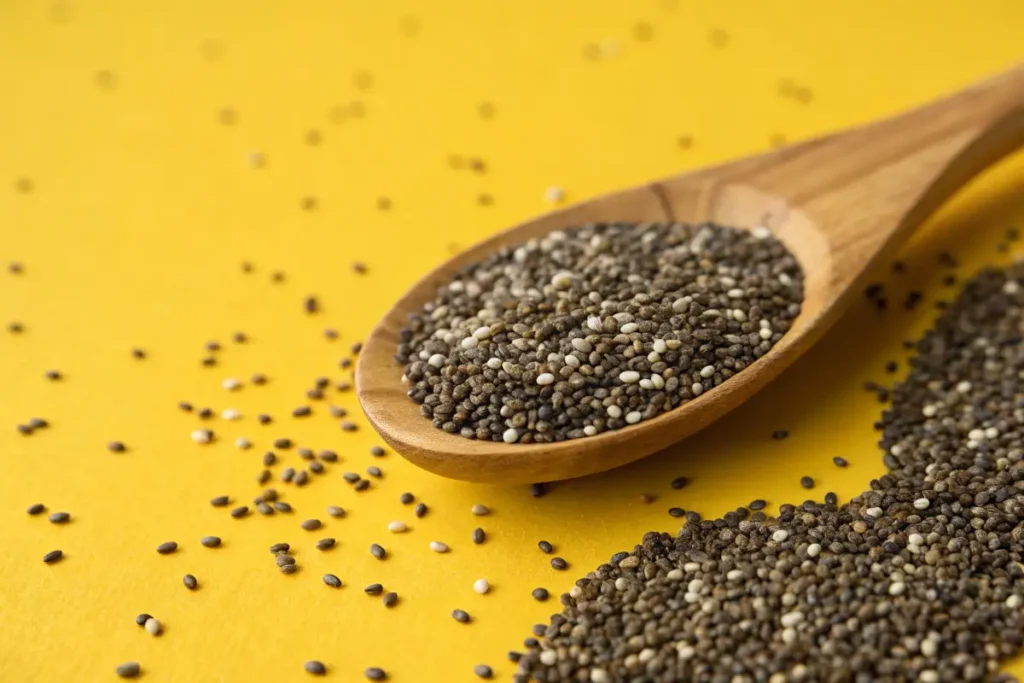
Evidence That Chia Seeds Fight Inflammation
Chia seeds are rich in omega-3 fatty acids, fiber, and antioxidants—all of which help lower inflammation. Omega-3s reduce the production of molecules in your body that cause inflammation. Fiber supports your gut health, which is closely linked to controlling chronic inflammation. Antioxidants protect your cells from harmful free radicals, which can lead to inflammation and disease.
Studies show that people who eat more omega-3s, like those found in chia seeds, experience lower levels of inflammation. Adding chia seeds to your meals is a simple way to support an anti-inflammatory diet.
Why Some People Worry About Inflammation from Chia Seeds
Some people worry that chia seeds might cause inflammation, but this is not true. Eating too much fiber at once, however, can cause bloating. These effects are not linked to inflammation, but rather to how your digestive system processes fiber.
To avoid these issues, start with small portions of chia seeds (1–2 tablespoons per day) and drink plenty of water. If eaten in moderation, chia seeds provide anti-inflammatory benefits without causing problems.
How Chia Seeds Compare to Other Foods
Chia seeds stand out when compared to processed foods that trigger inflammation. Snacks high in added sugars, unhealthy fats, and refined grains increase your risk of inflammation-related diseases. In contrast, chia seeds contain no harmful additives and are packed with anti-inflammatory nutrients.
By replacing inflammatory foods with chia seeds, you can reduce inflammation and lower your chances of chronic conditions like heart disease and arthritis.
Who Can Benefit Most from Chia Seeds?
Chia seeds are known for their wide range of health benefits. But who benefits the most from eating them? People dealing with inflammation, joint pain, or digestive issues may find chia seeds especially helpful. Let’s explore how these tiny seeds can improve health for different groups.
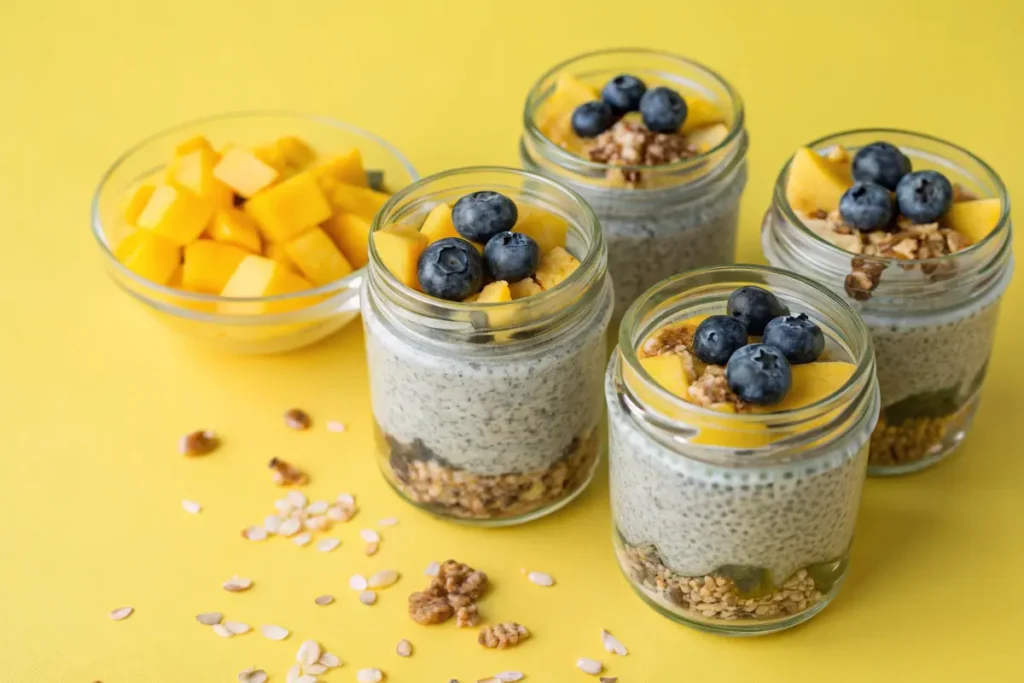
Reducing Inflammation in Arthritis and Joint Pain
If you suffer from arthritis or joint pain, chia seeds may be a helpful addition to your diet. These seeds are packed with omega-3 fatty acids, which reduce inflammation in the joints. When inflammation decreases, you may experience less pain and stiffness.
For people with arthritis, studies have shown that omega-3s can lower swelling and improve joint mobility. By eating chia seeds regularly, you can give your body the nutrients it needs to fight inflammation naturally.
Benefits for Gut Inflammation
Gut inflammation is often linked to digestive issues like bloating, cramping, or irregular bowel movements. Chia seeds, which are high in fiber, can help reduce these symptoms. The fiber in chia seeds feeds good bacteria in your gut, promoting a healthier microbiome.
Additionally, fiber creates a gel-like substance when it mixes with water, which soothes the digestive tract and supports smoother digestion. If you’ve ever wondered how chia seeds affect digestion, this is one of their most important benefits.
Impact on Cardiovascular Inflammation
Chia seeds also play a role in reducing inflammation that affects the heart. Omega-3 fatty acids lower levels of harmful cholesterol and decrease blood pressure, which reduces strain on your cardiovascular system. These anti-inflammatory effects protect the heart and reduce the risk of diseases like heart attacks and strokes.
If you’re looking to improve heart health while fighting inflammation, chia seeds are a simple and effective addition to your diet.
Can Chia Seeds Trigger Inflammation in Sensitive Individuals?
Chia seeds are generally safe and provide many health benefits. However, some individuals might experience side effects, especially if they have sensitivities or allergies. While chia seeds are not inherently inflammatory, certain reactions can cause discomfort. Let’s explore potential concerns and how to avoid them.
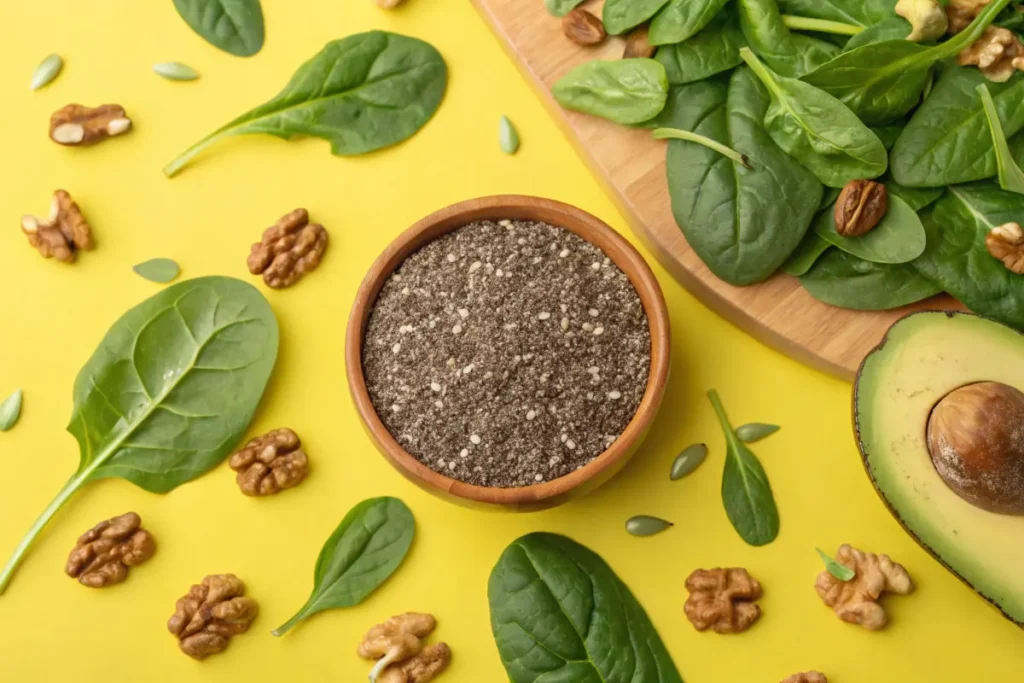
Possible Side Effects of Chia Seeds
Some people may experience digestive discomfort after eating large amounts of chia seeds. This is usually caused by their high fiber content. When your body is not used to consuming a lot of fiber, it can lead to bloating, gas, or cramping. However, these symptoms are not related to inflammation.
To prevent this, start with small portions of chia seeds, such as 1–2 tablespoons a day, and drink plenty of water. Gradually increasing your intake allows your digestive system to adjust and reduces the risk of discomfort.
Allergies and Inflammation Concerns
Although rare, some people are allergic to chia seeds. Allergic reactions may include itching, swelling, or stomach pain. These symptoms are not common, but individuals with seed allergies (like sesame or flaxseed) should be cautious when trying chia seeds for the first time.
If you suspect an allergy, stop eating chia seeds and consult a healthcare professional. Testing for food allergies can help confirm whether chia seeds are the cause.
Tips for Avoiding Adverse Reactions
Chia seeds are safe for most people when eaten in moderation, but here are some tips to avoid problems:
- Soak Chia Seeds Properly: Dry chia seeds absorb a lot of liquid. If eaten without soaking, they can expand in your stomach, causing discomfort. Always let them sit in water or milk for at least 15–30 minutes before eating.
- Drink Plenty of Water: Since chia seeds are rich in fiber, staying hydrated helps your body digest them more easily.
- Start Small: If you’re new to chia seeds, start with a small serving and increase gradually.
By following these tips, you can enjoy the benefits of chia seeds without any side effects.
Chia Seeds and Chronic Inflammatory Conditions
Chronic inflammation is linked to serious health problems, such as autoimmune diseases, diabetes, and obesity. If you’re asking, “Are chia seeds inflammatory?”, the answer is no—chia seeds are actually anti-inflammatory. They can help reduce inflammation and may improve symptoms of several long-term health conditions. Let’s explore how chia seeds support the body when dealing with chronic inflammation.
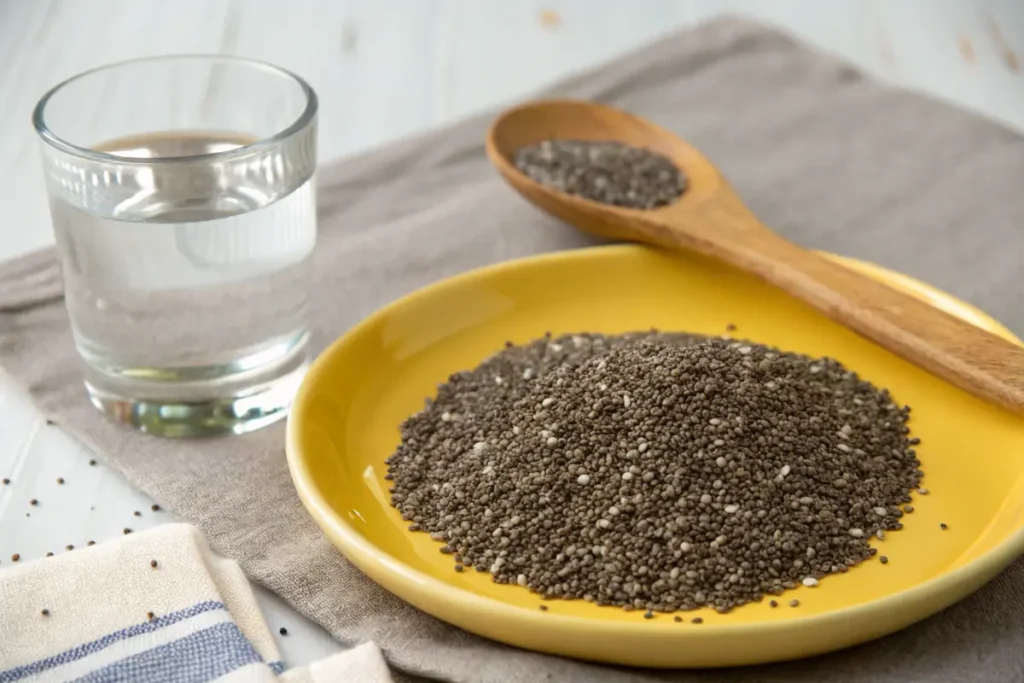
How They Impact Autoimmune Diseases
Autoimmune diseases, like rheumatoid arthritis and lupus, cause the body’s immune system to attack healthy tissues. This often leads to chronic inflammation and pain. Omega-3 fatty acids in chia seeds are known to reduce inflammation, making them helpful for people with autoimmune conditions.
For example, studies have shown that omega-3s can lower swelling and ease joint pain. Eating chia seeds regularly may help reduce flare-ups and improve overall comfort for those with autoimmune disorders.
Role in Managing Diabetes-Related Inflammation
Diabetes is often linked to chronic inflammation, especially in people with type 2 diabetes. Chia seeds can help manage this condition because they are rich in fiber and antioxidants. The fiber in chia seeds slows down the absorption of sugar, which prevents spikes in blood sugar levels. When blood sugar is stable, it reduces stress on the body and lowers inflammation.
Antioxidants in chia seeds also fight free radicals, which are harmful molecules that contribute to inflammation in people with diabetes. By adding chia seeds to meals, individuals with diabetes can better manage their condition.
Reducing Inflammation in Obesity
Obesity is another condition closely tied to inflammation. Excess fat in the body releases inflammatory molecules, which can lead to joint pain, heart disease, and other health issues. Chia seeds can support weight loss while reducing inflammation.
Thanks to their high fiber content, chia seeds keep you feeling full for longer, which can help you eat less. Additionally, the omega-3 fatty acids in chia seeds reduce inflammation caused by excess fat. If you’re managing your weight and dealing with chronic inflammation, chia seeds can be a valuable addition to your diet.
How to Incorporate Chia Seeds for Anti-inflammatory Benefits
Chia seeds are an easy and effective way to support your body’s fight against inflammation. They can be added to a variety of dishes, making it simple to enjoy their health benefits. Let’s look at the best ways to prepare chia seeds, combine them with other anti-inflammatory foods, and create delicious recipes to keep your diet exciting.
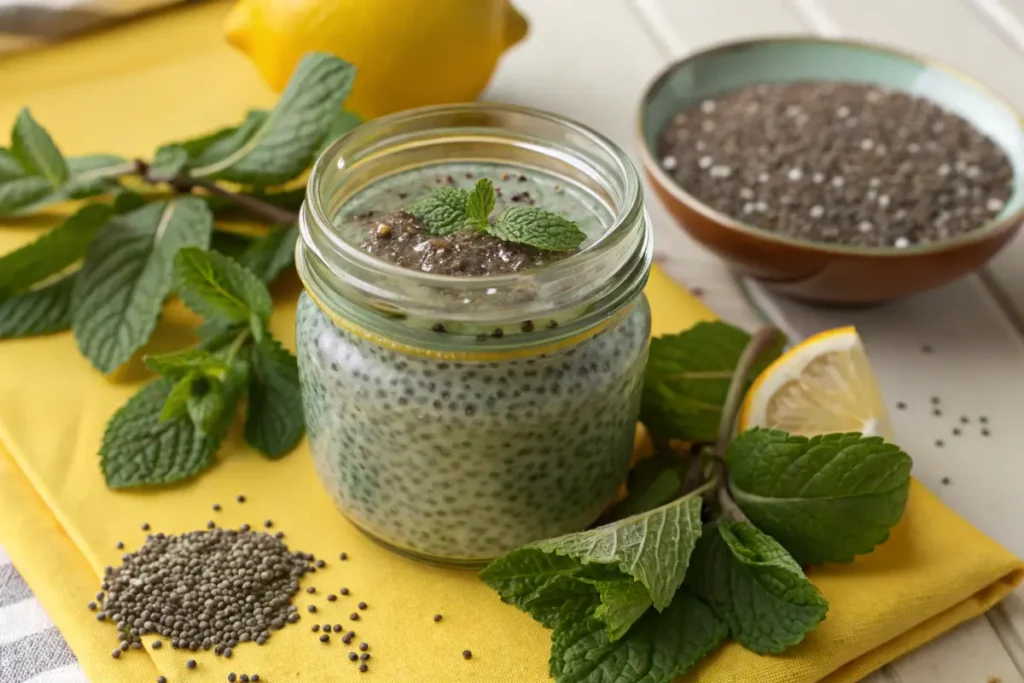
Best Recipes for Anti-inflammatory Chia Meals
Chia seeds can be used in many recipes that help reduce inflammation. For example:
- Chia Pudding: Mix chia seeds with almond milk and top with anti-inflammatory foods like blueberries.
- Smoothies: Blend chia seeds into a smoothie with spinach, ginger, and pineapple. Ginger and pineapple are both known for their anti-inflammatory properties.
- Chia-Infused Water: Soak a tablespoon of chia seeds in water, add lemon slices, and enjoy a refreshing drink that hydrates while reducing inflammation.
These simple recipes not only taste great but also help your body manage inflammation naturally.
Tips for Soaking Chia Seeds
Soaking chia seeds is an important step to ensure they are easy to digest and provide maximum health benefits. When chia seeds absorb liquid, they form a gel-like texture, which soothes the digestive tract and supports gut health.
To soak chia seeds, mix 3 tablespoons of seeds with 1 cup of water or almond milk. Let the mixture sit for at least 15–20 minutes. For creamier textures, soak the seeds overnight in the refrigerator. Proper soaking also prevents bloating and makes it easier for your body to absorb their nutrients.
Pairing Chia with Anti-inflammatory Foods
Combining chia seeds with other anti-inflammatory foods can enhance their benefits. For example:
- Pair chia seeds with avocado in a smoothie or salad to add healthy fats.
- Add turmeric to chia pudding for its strong anti-inflammatory effects.
- Combine chia seeds with probiotic yogurt to improve gut health and lower inflammation.
By pairing chia seeds with these foods, you can create meals that are not only delicious but also powerful for reducing inflammation.
The Science Behind Chia Seeds and Inflammation
Science shows that chia seeds are not only healthy but also anti-inflammatory. If you’ve been wondering, “Are chia seeds inflammatory?”, research provides a clear answer: chia seeds fight inflammation in the body. Let’s examine the studies that explain how chia seeds reduce inflammation and improve overall health.
Studies on Omega-3s in Chia Seeds
Chia seeds are one of the richest plant-based sources of omega-3 fatty acids, especially alpha-linolenic acid (ALA). Research shows that omega-3s lower the production of inflammatory molecules in the body. For example, a study found that people who consume more omega-3s experience reduced swelling and better joint health.
By adding chia seeds to your diet, you can give your body the omega-3s it needs to fight inflammation naturally.
Clinical Research on Inflammation Markers
Inflammation markers, like C-reactive protein (CRP), are used to measure the level of inflammation in your body. Studies reveal that people who eat chia seeds regularly have lower levels of these markers. In one study, participants who included chia seeds in their diet experienced reduced CRP levels, which suggests that chia seeds can help control chronic inflammation.
This evidence highlights why chia seeds are often recommended as part of an anti-inflammatory diet.
Evidence Supporting Their Role in Reducing Inflammatory Stress
In addition to omega-3s, chia seeds contain powerful antioxidants that fight free radicals, which cause cell damage and inflammation. A review of scientific studies showed that antioxidants in chia seeds protect your body from oxidative stress, which can lead to long-term inflammation.
By reducing oxidative stress, chia seeds help your immune system work more efficiently. This is one reason why scientists classify chia seeds as an anti-inflammatory superfood.
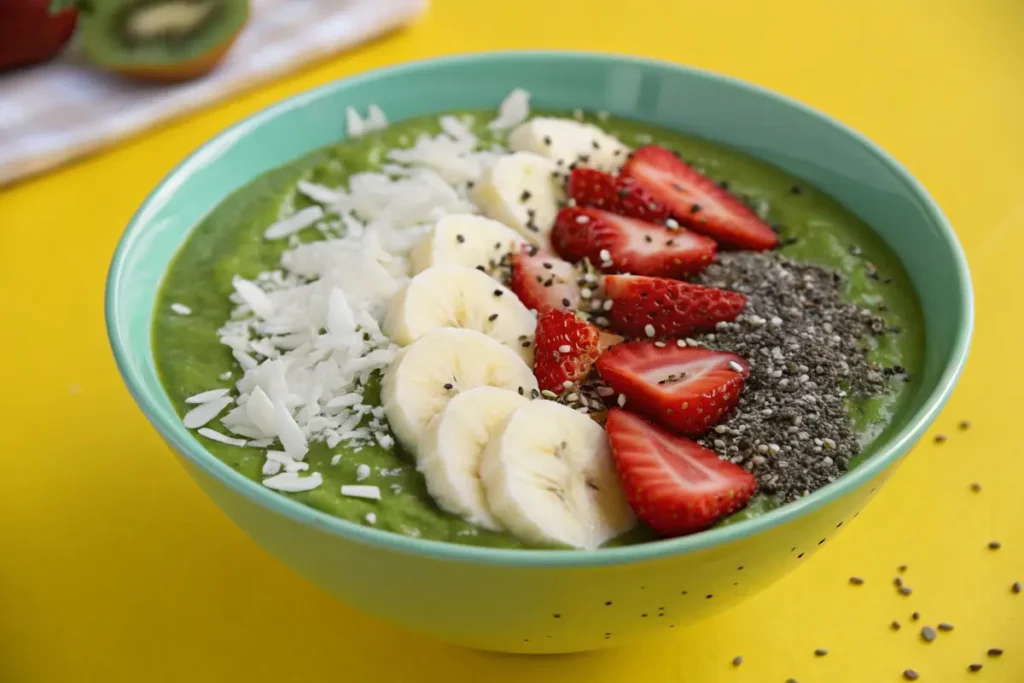
Conclusion: Are Chia Seeds Inflammatory?
If you’ve been wondering, “Are chia seeds inflammatory?”, science clearly shows they are anti-inflammatory. Chia seeds are packed with omega-3 fatty acids, fiber, and antioxidants, which all work together to reduce inflammation and improve overall health. Whether you’re managing chronic conditions like arthritis or simply want to protect your body from long-term inflammation, chia seeds are an easy and effective addition to your diet.
To explore creative ways to enjoy chia seeds, try this simple chia seed pudding recipe. It’s a versatile and gut-friendly option that fits perfectly into an anti-inflammatory diet. If you’re looking to expand your healthy eating options, you might also like to learn whether cottage cheese is anti-inflammatory and how it can benefit your body.
For more healthy lifestyle inspiration, check out these meal prep ideas to make planning nutritious meals easier. By incorporating chia seeds into your routine and exploring other anti-inflammatory foods, you’ll be taking a big step toward better health and well-being.

